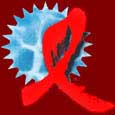

April 1998, Vol 1. No. 2
[English] [Français] [Español]
[Index] [Page 1] [Page 2] [Page 3] [Page 4]
COMMUNITY UPDATES
Here is an update on several main features of activities
that will target Community participants this summer in Geneva.
Community Rendez-Vous
The Community Rendez-Vous will be a forum for
community exchange and skills development. It will begin on Friday, June 26 in the late
afternoon with a retrospective plenary looking back to Vancouver 1996 followed by a
community reception. Saturday, June 27 will be a full day consisting of regional and
subregional meetings, followed by targeted network meetings on community-based research,
human rights, sex work, migration and a joint GNP+/ICW meeting. There will also be Skills
Building sessions on treatments activism and computer use. A plenary summary session
including community resolutions will take place in the early evening of Thursday, July 2.
The main focus of the Community Rendez-Vous will be on communication and mechanisms for
better networking.
Registration for the CRV will be offered to all community-based scholarship recipients.
There will also be registration (up to 200 people) at Palexpo on June 26 for other
community-based delegates who are attending the Conference through other means of support.
There will be an overall limit of 200 people from each of the 5 regions of the world.
There will also be alternative meetings preceding the Conference, including a Prevention
Symposium, a Nurses' Satellite, a Treatments Activist Training workshop, and various
commercial satellites.
Community Symposia
In the evening (from 5:30pm – 8pm) of
each of Monday 29 June, Tuesday 30 June and Wednesday 1 July, there will be four or five
community-led symposia. These will deal with a number of issues related to community
action and HIV/AIDS. The formats for these symposia will vary according to issues, but
will focus on interactive exchange including case studies, demonstrations, and workshops.
Topics include strategic lobbying; developing national and international networks; human
rights and AIDS; long-term survivors; treatment access by the South for the South; role of
HIV+ people in prevention; sex work; alternative and traditional therapies; religion and
HIV (how believers are addressing HIV/AIDS within their religious bodies, and lessons to
use); and AIDS and media responsibility.
Orientation Sessions
Orientation sessions to help delegates, especially newcomers to large international AIDS
conferences, will take place in the morning and early afternoon of Sunday 28 June.
These will be offered in English, French and Spanish and will be approximately an hour in
length. They will cover three aspects: making sense of the Conference programme; making
sense of the Conference Centre; and making sense of Conference language.
Skills Building Programme
Over the past few years, the Skills Building
programme has become an increasingly important component of the programmes at
international AIDS conferences. Skills Building programmes offer capacity building in key
content areas and complement the scientific sessions.
Skills Building sessions are aimed principally at delegates from the South; poverty and
working in resource-poor settings will be addressed in all content areas. Eighteen topic
areas have been identified and grouped under five headings: developing/implementing
prevention strategies; programme and organisational development; care and treatment of
HIV; policy and advocacy; information and communications technology. Specific workshop
titles and descriptions will be available by April 15th.
The Skills Building workshops conducted during the course of the Conference will be made
up of six to seven workshops offered simultaneously during two time periods (from
11: 00 AM to 2: 30 PM and 3: 00 PM to 6: 30 PM) on Monday 29 June,
Tuesday 30 June and Wednesday 1 July, and one time period (from 11: 00 AM to
2: 30 PM) on Thursday 2 July. In addition, several skills building sessions will be
offered during the Community Rendez-Vous (Friday 26 June to Saturday 27 June and Friday 3
July). Most skills building sessions will be conducted in English, though some of the
workshops will be offered entirely in French or Spanish, and/or targeted to participants
working in a specific geographic region.
Visit the Community page of the Conference Web site in Mid-April for an update on the
Skills Building Programme.
Child care
Child care will be available for Conference
delegates. A special request needs to be made on the registration form or be received at
Congrex by May 1, 1998. Please note the child's age and special needs, if any. Basic child
care will be free of charge but parents should supply basic needs such as nappies, a
change of clothes, etc. and provide for any special dietary requirements.
Community Village
The Community Village will be the central
location for NGO and community activity. It will contain the NGO booths and a special area
illustrating the Swiss Response to HIV. It will also be the focal point for the Electronic
Talking Tree, the 12th World AIDS Conference's message and programme services. The
Internet Café will be housed here. Special lounge areas for informal exchange and session
overflow viewing will be part of the Village. Just to one side will be a lounge area for
PWAs, which will provide basic nourishment needs for diverse medication regimens and a
space for rest and relaxation. Through the PWA lounge, delegates can get assistance in
readjusting their medication schedules over time zones. Information to this effect will be
available on the Conference Web site in April. An area for cultural responses to HIV/AIDS
will be accessed through the Village. The Conference Centre, Palexpo, will be non-smoking.
The Community Liaison Officer, Christopher Park, can be reached at
The 12th World AIDS Conference
94, rue des Eaux-Vives
1207 Geneva
Switzerland
Tel : +41 22 737 33 44
Fax : +41 22 700 33 11
e-mail : park@aids98.ch
[Main Page]
[Email Us] [Join our List ]
[Registration ]
© The 12th World AIDS Conference,1997.
All rights reserved.
Text and images on this page may be reproduced for non-commercial purposes only.






